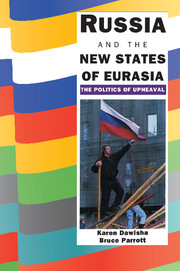Book contents
- Frontmatter
- Contents
- Preface
- Maps
- Introduction
- 1 The Legacies of History
- 2 National Identity and Ethnicity
- 3 The Impact of Religion
- 4 Political Culture and Civil Society
- 5 The Impact of Economics
- 6 Foreign Policy Priorities and Institutions
- 7 Military Issues
- 8 The Nuclear Factor
- Conclusion
- Appendix A Chronology of Events, January 1992 to October 1993
- Appendix B Compendium of Leadership and Institutional Changes in the Eurasian States, January 1992 to October 1993
- Appendix C Soviet Census Data, Union Republic and ASSR, 1989
- Notes
- Index
4 - Political Culture and Civil Society
Published online by Cambridge University Press: 06 July 2010
- Frontmatter
- Contents
- Preface
- Maps
- Introduction
- 1 The Legacies of History
- 2 National Identity and Ethnicity
- 3 The Impact of Religion
- 4 Political Culture and Civil Society
- 5 The Impact of Economics
- 6 Foreign Policy Priorities and Institutions
- 7 Military Issues
- 8 The Nuclear Factor
- Conclusion
- Appendix A Chronology of Events, January 1992 to October 1993
- Appendix B Compendium of Leadership and Institutional Changes in the Eurasian States, January 1992 to October 1993
- Appendix C Soviet Census Data, Union Republic and ASSR, 1989
- Notes
- Index
Summary
Perhaps the most striking feature of Mikhail Gorbachev's effort to reform the Soviet system was his decision to invite public discussion of the fundamental political issues that his predecessors had masked for decades behind a facade of public unanimity. By abandoning the ideological myth of a “solidary society” whose members are united around a single political goal, Gorbachev's campaign for glasnost’ and reform from below electrified a profoundly alienated citizenry and opened a path toward what one scholar has aptly called the “reinvention of politics.” As a result, Soviet political culture entered a period of tremendous ferment, and voluntary political participation grew exponentially. These developments, which far exceeded Gorbachev's original intent, ultimately contributed to the public's repudiation of the Communist order and to the creation of fifteen independent states.
However, the depth of the domestic changes and their implications for the behavior of the new states remain uncertain. On first glance, the foreign policy implications of democratic versus dictatorial political outcomes in the new states seem clear. If the new states evolve into full-fledged, stable democracies, war among them will be less likely. Coupled with the higher level of public discourse and information fostered by democratic debate, the citizenry's reluctance to suffer the human and material costs of war will make military aggression a more difficult option for decision-makers to choose. This, however, is not the whole story. Although a substantial body of evidence supports the proposition that democracies do not wage war on each another, they have often waged wars – and not just defensive wars – against nondemocratic states, partly because they distrust those states on ideological grounds and regard them as illegitimate.
- Type
- Chapter
- Information
- Russia and the New States of EurasiaThe Politics of Upheaval, pp. 123 - 160Publisher: Cambridge University PressPrint publication year: 1994



